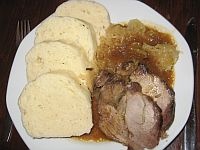 |
Vepřová, Knedlik, Zéli a Pívo (Pork Roast, Dumplings, Sauerkraut and Beer) from Dejvická Sokolovna in Prague |
Vepřová, knedlik, zéli a pívo (or V.K.Z. as it is simply known in modern-day Czech language) is as profoundly Czech as Weisswurst is Bavarian, Po-boys are New Orleanian and Tom-Yum soup is Thai. V.K.Z. is the Czech national dish.
Roasted vepřová is a close cousin of the Bayrischer Schweinebraten, although the Schweinebraten uses a dark-beer sauce, while the vepřová sauce is clear. Vepřová can be made with lean pork, pork belly (bůček) or smoked pork. It is typically served with sauerkraut and flour dumplings, except for the smoked-pork variety, which is served with spinach and potato dumplings.
Preparing home-made sauerkraut is a lengthy, and technically very delicate procedure, involving sterilized implements and containers, and closely controlled environment variables. Fresh cabbage is sliced and layered in a large sterilized jar, alternating layers of cabbage and layers of salt. The cabbage ferments at room temperature (70 deg F) for 1-2 months, while the amount of liquid released by the cabbage in the jar is closely monitored. The procedure may be lengthy but the result is worth it, relative to store-bought canned kraut. Before serving, the homemade sauerkraut is sauteed with onions, caraway seeds, some sugar and possibly white wine.
The choice of dumplings is yet another fundamental matter. Smoked pork is served with slices of potato dumplings, while roasted pork is served with either bread dumpling, or a mix of bread and potato dumplings. 4-8 slices are usually served. Czech dumplings, unlike their Bavarian cousins, are shaped into a foot-long cylinder and boiled whole, then sliced before serving. Bavarian dumplimgs are shaped into tennis-ball-size spheres, cooked and cut in half before serving. These seemingly superficial differences are nevertheless as profound as preferring your New Orleans gumbo with or without roux, o choosing between green or red chili in New Mexico ...
Decent (and we do mean decent) lager beer is the natural accompaniment to this dish.
Ingredients:
- 2 tbsp vegetable oil
- 1 tbsp prepared mustard
- 2 tbsp caraway seeds
- 1 tbsp garlic powder
- 1 tbsp salt
- 2 tsp ground black pepper
- 5 lb pork shoulder blade roast
- 3 medium onions, chopped
- 1/2 cup beer
- 1 tbsp cornstarch
- 2 tbsp butter
Preparation:
- In a bowl, form a paste using the vegetable oil, mustard, caraway seeds, garlic powder, salt, and pepper. Rub over the pork roast, and let sit about 30 minutes.
- Preheat oven to 350 deg F (175 deg C).
- Arrange the onions in the bottom of a large roasting pan. Pour in the beer. Place the roast, fat side down, on top of the onions. Cover the pan with foil.
- Roast 1 hour in the preheated oven. Remove foil, turn roast, and score the fat. Continue roasting 2 1/2 hours, or to a minimum internal temperature of 160 deg F (70 deg C). Remove from heat, reserving pan juices, and let sit about 20 minutes before slicing thinly.
- In a saucepan, bring the reserved pan juices to a boil. Mix in the butter and cornstarch to thicken, reduce heat, and simmer 5 to 10 minutes. Serve with the sliced pork.

Pork roast with red and white kraut and potato dumplings:
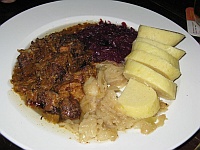
|
Smoked pork with flour dumplings, potato dumplings and spinach:
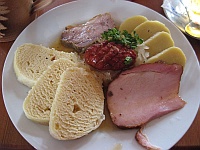
|
Smoked pork with potato dumplings and spinach:
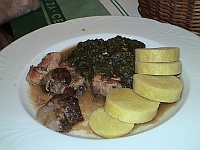
|
Smoked pork with potato dumplings and spinach:
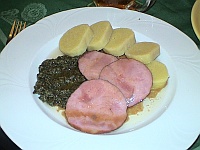
|
Carlsbad dumplings, potato dumplings, and a bread dumpling: |
|
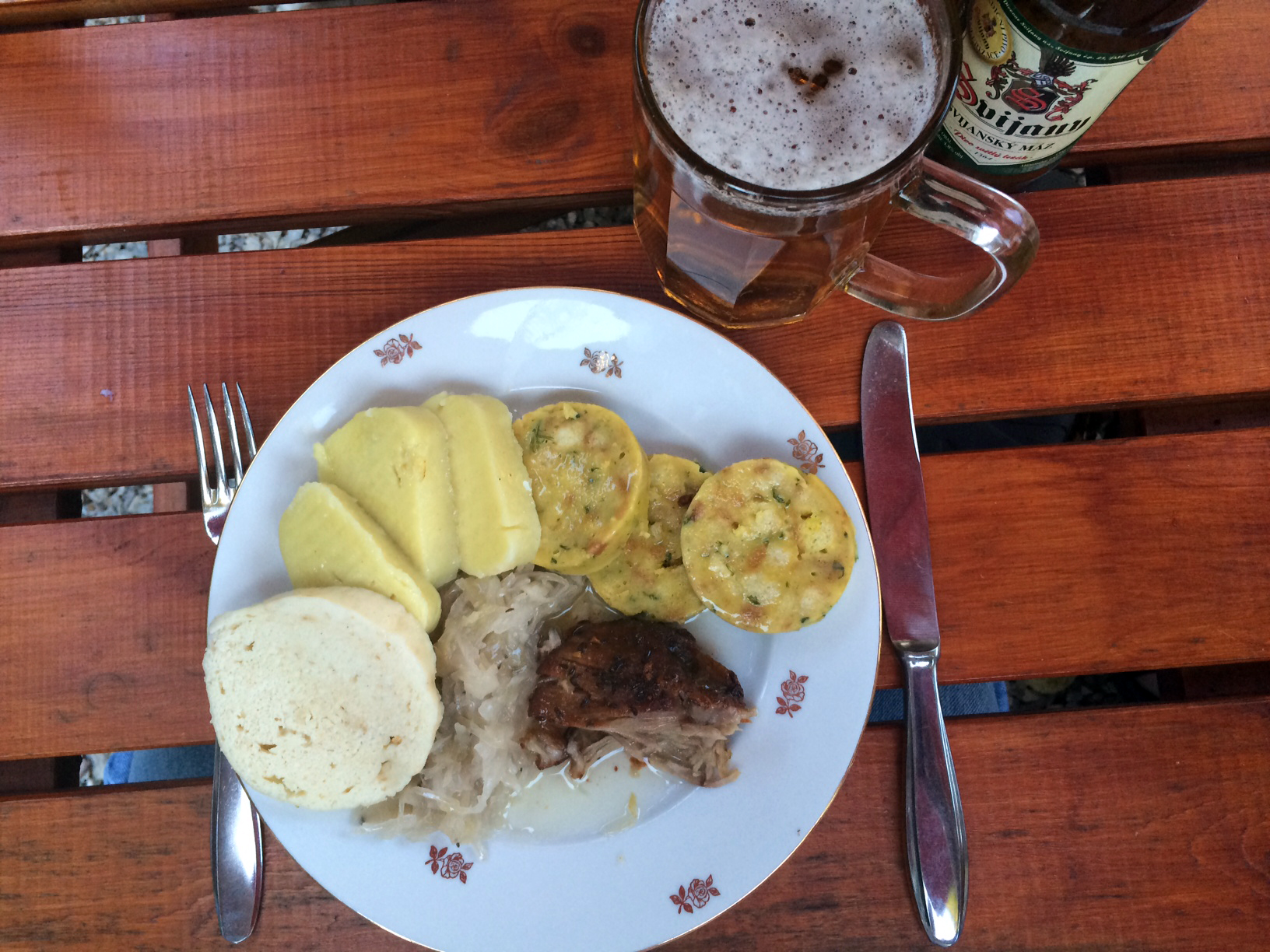 |
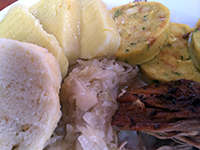 |
back to Radim and Lisa's Well-Travelled Cookbook | email us
Last updated: October 12, 2010
